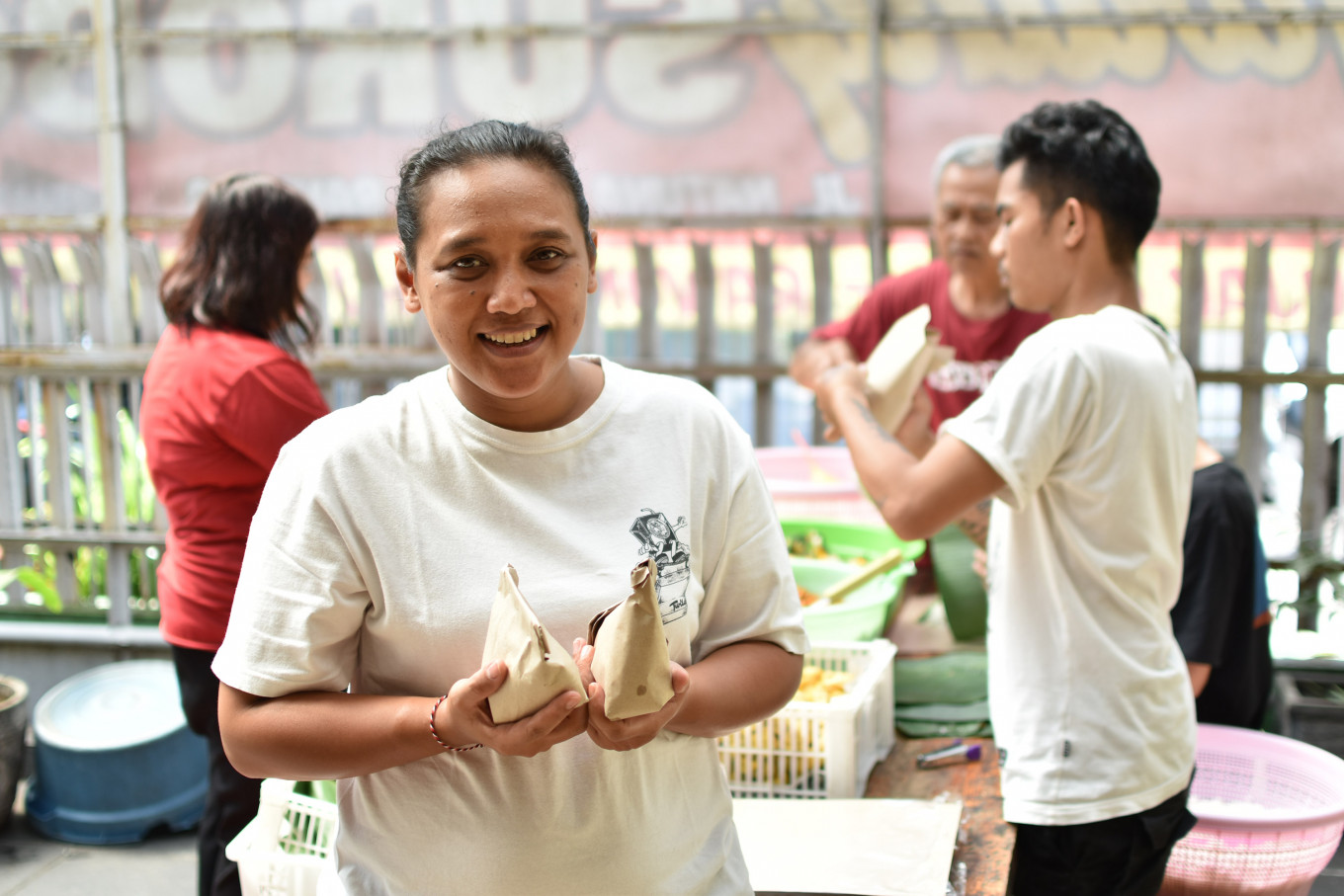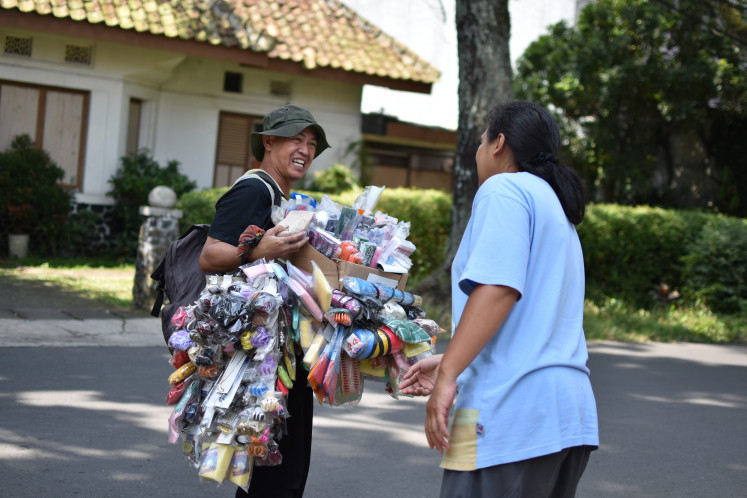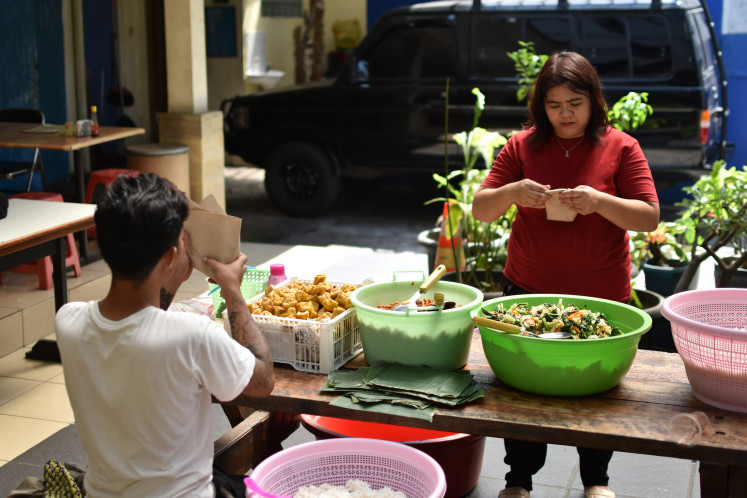Popular Reads
Top Results
Can't find what you're looking for?
View all search resultsPopular Reads
Top Results
Can't find what you're looking for?
View all search resultsNasi Bungkus Dua Ribu transcends boundaries with kindness
Bandung grassroots initiative Nasi Bungkus Dua Ribu talks about not looking to slow down as it enters its fourth year of humanitarian efforts and caring for people beyond its hometown
Change text size
Gift Premium Articles
to Anyone
“Tarps are really needed here. Not only to be used as roofs […]” said a man in a video over the loud calls of frogs in the dark. The man was taking a video of the situation in one of the refugee camps near the epicenter of the November 2022 earthquake in Cianjur, West Java. “This is the 3rd camp out of […]” The voice slowly faded out.
“Those are hay, Mas,” said Ismaya Safitri, founder of Bandung grassroots humanitarian initiative Nasi Bungkus Dua Ribu (rice packs priced at two thousand rupiah), speaking to The Jakarta Post on Jan. 12.
She was pointing out how the refugees slept in the video that she was showing, taken by her friend from the Indonesia OffRoad Federation (IOF). The refugees were sleeping with just a tarp over their heads and some were even without cover.
Nearing the epicenter
During heavy rains, fecal matter and urine overflowed from the emergency latrine that the refugees dug. “Then it entered their living spaces. The tents,” said Safitri. It wasn’t long until the refugees were infected with scabies. “Some of the areas of the village were closed off because everyone was infected. Blisters were all over them.”
Safitri was there. She rode with her fellow humanitarian volunteers hailing from the IOF “10 hours from the city center, due to the terrain,” Safitri recalled. She described how the off-road motorcycles, six of them all fully strapped with gallons of drinking water and loaves of bread that she frantically bought from a supermarket at Jl. Sunda, were frequently caught in mudslides and how they had to stop in heavy rains.
Sharing is caring: Nasi Bungkus Dua Ribu was initially her response to the COVID-19 pandemic but she kept finding value in continuing the efforts indefinitely (JP/Anindito Ariwandono) (JP/Anindito Ariwandono)Although Safitri did not spend the night, others from the IOF spent a week at the location to tend to the refugees.
“There wasn't much [aid] that reached there due to the location,” said Safitri. The refugees’ water supply was even cut off during the earthquake because the terrain moved. Nasi Bungkus Dua Ribu opened a donation for building a facility to collect water once, “but there was really nothing to collect.” There were no means for the refugees to cook too, initially, hence the bread and the longer-lasting supplies that they brought.
Safitri admitted that it was really hard for her to collect donations for the Cianjur earthquake. “People didn’t seem to trust me and they said that there’s already too much for Cianjur,” she said as she lit a Javanese herbal cigarette. “But really, not much reached there as it was deeper into Cugenang [district] and harder to reach. Now, they have no money to rebuild their houses.”
She shuddered when the thought of being late in delivering the aid crossed her mind. “They could’ve died.”
A helping hand
When the lockdowns rolled out, the initiative was Safitri’s response to help those in need of sustenance. With people being told to not leave their homes and businesses being put on restrictions, the masses’ consumption pattern changed and people were suddenly deprived of their means to make their living.
Safitri’s immediate circle was also affected. “Some lost their jobs and had only enough money to provide for their family for only a single month,” said Safitri.
“Let’s try to help others,” Safitri recalled her thoughts back then. Warung Suroboyo, a family-run restaurant in Jl. Natuna, Bandung, founded by Safitri’s mother in 1986, became her base of operations.
“At first, we were still selling the rice packs for Rp 5,000,” said Safitri. “So that everyone, I mean everyone, from the poor to the haves, can afford a nutritional meal with a reasonable price.” Safitri’s standard meal for the pack consists of rice, vegetable sides and a protein source, usually tofu or tempeh. “Not fancy,” Safitri chuckled.
She did supply runs at 2 a.m. every day except weekends, going to Andir wet market in Ciroyom, Bandung, by herself using her black 1990s Toyota Kijang and went home to cook at 5 a.m. These days, Safitri’s three employees, Alan, Rendy and Ratmi, handle the cooking while the once-out-of-job vegetable courier that Safitri met at the market handles the supply runs.
Safitri started giving away some of the rice packs to ojek drivers and garbage collectors, as suggested by her friends. At one point, she came across a scavenger pulling a large cart near where she was stopping.
Hard at work: Rendy (left) and Ratmi's usual day starts with cooking for the rice packs at 5 a.m. on weekdays before handing the packs to Safitri for distribution (JP/Anindito Ariwandono) (JP/Anindito Ariwandono)She gave one to the scavenger for free, but was immediately hurled back with complaints instead of appreciation. “What is this? Spoiled rice from yesterday?” Safitri imitated what the scavenger said.
“I was really hurt. We were really tired, you know. We were really spent after going to the wet market, after all the cooking. We simply hadn’t gotten the hang of it yet,” The rice that the scavenger complained about was the exact same kind of rice that Safitri eats everyday.
The decision to have it sold for Rp 2,000 was proved to be quite inspiring as it struck a chord with a lot of people. “Rp 2,000 was the price people here used to pay for parking. It was so that people would appreciate the meal,” mused Safitri. Whether intentional or not, it somehow also gave a deeper value to the customers as humans because it considers the dignity of the receiving end.
The titular value of which the rice packs were sold for then gained resonance with more and more people after the media started covering Safitri’s story. Some were even following her on the streets as she was selling the rice packs, a situation that Safitri was really familiar with as she often did work with the media in Jakarta during the 1990s.
“After that, I even reached 1,000 rice packs a day,” she reminisced. In six months time, Safitri decided that it was time for them to just give away the rice packs for free because the price scheme was deemed ineffective. “People had started to cook for themselves again.”
“Until now, the rice packs are being given for free,” said Safitri. However, she applies a certain set of criteria on whom she gave the rice packs to. “I’m not keen on giving to scavengers.”
Safitri had another experience where the scavenger that she just gave a rice pack to was casually buying coffee from Yumaju, a coffee shop chain catering to the middle to upper segment in Bandung. “She even paid with QR and with an iPhone!” Safitri laughed dryly.
On being hungry
As the initiative enters its fourth year, Safitri is showing no signs of slowing down or even stopping. “Will this ever stop? No. I’m willing to bet on it. I made a promise to myself that I will keep doing it until I die,” Safitri remarked boldly. Nasi Bungkus Dua Ribu’s current dependence on donation poses quite a risk for it to be a continuing effort. However, Safitri is willing to dig into her personal savings if donations were to stop coming.
The simple act of giving away rice packs for people in need ultimately became one of her major traits which she brought to wherever she goes. “Yogyakarta, Surabaya, Denpasar,” Safitri recalled the cities where she did impromptu giveaway sessions during the pandemic.
In Denpasar in 2021, Safitri claimed that the tourist hot spots were all engulfed in darkness. “Almost not a single light on,” remembered Safitri. The island was hit particularly hard due to its higher dependence on tourism.
Safitri, who was staying at the Courtyard by Marriott Bali Seminyak Resort free of charge because of her friends, peddled bicycles with some of the bigger hotels’ general managers along the coast using a dune buggy that was filled with food supplies.
“But it was harder to find people that would accept it,” she recalled. The younger people would politely reject the donations while they would refer to the more elderly who were much more in need. “I can still work, Ma’am,” they said to Safitri.
Her most heart wrenching experience there was coming across an elderly, disabled couple in their 80s who were living in a rundown shack that was roughly the size of a security guard post. “Not even a mattress,” Safitri said. “But they were there, right behind the big hotels.”
Being acquainted with gnashing pangs of hunger for days on end in her younger days while living in Jakarta in 1997 is seemingly the main drive in her initiative. Being top of her class at Jakarta's London School of Public Relations, Safitri was familiar with the world of media as her place of study was on the third floor of the old Press Council Building. She then worked multiple jobs in the industry to make ends meet while holding her studies.
“I’m a single mother. I’d very much like to teach my daughter to have the same grit that I have,” Safitri said in closing.













